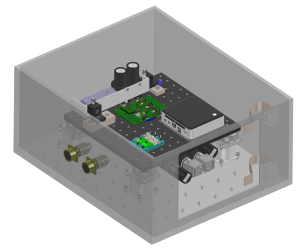
An Automated Microfluidic and Imaging Platform for Live-Cell Investigations in Microgravity
Understanding the effect of microgravity on human physiology is critical for long-term space flight.
Currently, there are limited facilities onboard the ISS National Lab that are capable of real-time
live-cell interrogations in a microgravity environment. Unfortunately, most on-orbit investigations
are restricted to “end-point” types of research experiments for protein or RNA expression analysis at
a single, discrete time-point.
In order to fully understand the effects of microgravity on cell
function, researchers need the ability to monitor subcellular processes in real-time to identify,
characterize and quantify the transient, yet significant cellular responses to microgravity. The BioChip SubOrbitalLab (BC-SOL) is being developed to offer government, academic and industry researchers the ability to observe cell function in real-time for the duration of a sub-orbital flight. The BC-SOL has been selected by NASA to perform two flights with Blue Origin’s New Shepard vehicle in early 2018. Flights 1 and 2 will perform state-of-the-art research to quantify the effects of launch, microgravity and return on human neuron and microglia function, respectively, in real-time for the full duration of the sub-orbital flight.